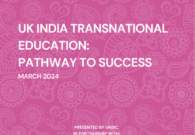Commodore Bunty on India Submarine Programme
Commodore Bunty, Director Aerospace & Defence at the UK India Business Council (UKIBC), leading the Aerospace & Defence Industry Group (ADIG), commented in the India – Defence & Security Export Update of the Defence and Security Organisation, Department for International Trade
| Submarine Perspective Plan
The Indian Navy’s blueprint for augmentation of submarine force levels is enshrined in the 30-year Submarine Perspective Plan, which was approved in 2002. As a part of the plan, India was to build 24 submarines, that is, 18 conventional and six nuclear-powered submarines, as an effective deterrence to China and Pakistan. The Perspective Plan resulted in the production of two distinct submarine designs, Project 75 (P-75) and Project 75-I (P-75I), to be built simultaneously. As part of Project 75, India signed a deal with Naval Group (erstwhile DCNS) France, in 2005 for building six Scorpene class diesel submarines at Mazagon Dock Ltd (MDL) at an approx. cost of $3.5 billion, with delivery to commence by 2012. However, due to inordinate delays and teething problems, the first submarine entered service only in Dec 2017 and the second in Sep 2019. Delivery of the remaining four submarines is expected by 2022. The P75I Opportunity P-75I India requires six Air Independent Propulsion (AIP) submarines to be constructed by an Indian Strategic Partner at a domestic public or private shipyard with 65% indigenous material, in collaboration with a foreign technology partner, approval for which was accorded by the Defence Acquisition Council (DAC) in Jan 2019 at an approx. cost of INR 45,000 crore ($6.3 billion). In addition, the IN would have the option to manufacture six additional submarines under the project. This is the second project under the Indian MoD’s ambitious Strategic Partnership (SP) model that aims at providing a significant fillip to ‘Make in India’ programme, the first being manufacture of 111 Naval Utility Helicopters (NUH). As per the contract, the OEM will have to provide full technology transfer of critical systems of the submarines including AIP as also help establish a domestic supply chain for spare parts and material. The OEMs will be free to set up joint ventures or equity partnerships, or make royalty arrangements with Indian prime partners and other domestic suppliers. Strategic Partnership Two domestic shipyards companies, state-owned MDL and private sector firm Larsen & Toubro (L&T) were shortlisted in July 2019 to collaborate with five OEMs, Rubin Design Bureau of Russia (Amur 1650), Naval Group of France (Scorpene 2000), Navantia of Spain (S-80), ThyssenKrupp Marine Systems of Germany (HDW 214) and Daewoo Shipbuilding & Marine Engineering of RoK (KSS-III). In accordance with pre-Covid 19 timelines, Request for Proposals (RFPs) were to be issued to the two shortlisted Indian SPs, who were then to set up a technical partnership with one of the five shortlisted OEMs and submit financial as well as technical bids by end-2020. Thereafter, the technical and financial bids were to be evaluated, with final selection expected in mid-2022. However, given the current economic conditions in the country, these timelines are likely to slip considerably. Prospects for the UK Of the five OEMs shortlisted, critical equipment for Navantia’s S-80 and DSME’s KSS-III platforms have been supplied by UK companies, which includes Weapons Handling Equipment (WHE) by Babcock International and Towed Array Sonar System by QinetiQ. UK Industry have also been supplying pressure hull domes for the S-80. Given that the contract mandates 65% indigenous content, UK companies need to take the initiative and offer their products and services by partnering with companies in India as well as the two Indian SPs, MDL and L&T. In addition to the potential sale of equipment there are other benefits to the UK industry from potential involvement in terms of services/equipment for capability development including training and through long-term life cycle support The involvement of UK industry with P 75I project, direct or indirect, will open up major avenues for shipbuilding in India, the next core sector likely to attract major investments in future.. For more about India’s reforms and what they mean for British business approaching the Indian market, Bunty can be reached at: bunty.sethi@ukibc.com |







